 Petzlover
Petzlover Harlequin Pinscher is originated from Germany but Smalandsstovare is originated from Sweden. Harlequin Pinscher may grow 21 cm / 8 inches shorter than Smalandsstovare. Harlequin Pinscher may weigh 13 kg / 28 pounds lesser than Smalandsstovare. Both Harlequin Pinscher and Smalandsstovare has almost same life span. Both Harlequin Pinscher and Smalandsstovare has almost same litter size. Both Harlequin Pinscher and Smalandsstovare requires Low Maintenance.
Harlequin Pinscher is originated from Germany but Smalandsstovare is originated from Sweden. Harlequin Pinscher may grow 21 cm / 8 inches shorter than Smalandsstovare. Harlequin Pinscher may weigh 13 kg / 28 pounds lesser than Smalandsstovare. Both Harlequin Pinscher and Smalandsstovare has almost same life span. Both Harlequin Pinscher and Smalandsstovare has almost same litter size. Both Harlequin Pinscher and Smalandsstovare requires Low Maintenance.
 This toy-sized dog is a type of Miniature Pinscher originating in Germany. The dog was developed by crossing traditional Miniature Pinschers with other toy-sized short-haired terriers. He falls into the Terrier category.
This toy-sized dog is a type of Miniature Pinscher originating in Germany. The dog was developed by crossing traditional Miniature Pinschers with other toy-sized short-haired terriers. He falls into the Terrier category.
The dog was used to kill rats, but has always been a devoted pet at the same time. They nearly became extinct after World War II, but the breed was once again restored. Today it is an established breed, but it isn’t recognized by any of the major kennel clubs.
In fact, The Harlequin Pinscher Association is the only breed club that recognizes the Harlequin Pinscher. It can be registered with the Harlequins Pinschers Association or with the American Canine Association.
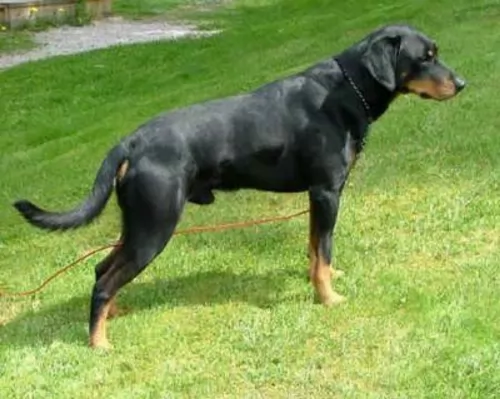 The Smålandsstövare has got quite a long history and dates back to the 1600s. He is the smallest of the Swedish hound breeds. This is a scenthound.
The Smålandsstövare has got quite a long history and dates back to the 1600s. He is the smallest of the Swedish hound breeds. This is a scenthound.
Hounds similar to the Smålandsstövare were bred with European hounds and then brought to Småland and bred with local spitz-type farm dogs to create the foundation stock for the Smålandsstövare.
The dog was used to hunt but nearly died out in the 20th century, but breeders restored it and the first official standard emerged by the Swedish Kennel Club in 1921.
The Smålandsstövare is a rare dog breed but it is recognized by the American Rare Breed Association as well as other major kennel clubs, one of which is the Federation Cynologique Internationale as well as the United Kennel Club.
 This is a small compact dog standing at 25 – 33cm in height and weighing about 3kg to 4 or 5kg. He has dark eyes and ears which are set high and which are erect with just the top of them folding forwards.
This is a small compact dog standing at 25 – 33cm in height and weighing about 3kg to 4 or 5kg. He has dark eyes and ears which are set high and which are erect with just the top of them folding forwards.
The legs are straight and thin with small cat-like shaped paws. The tail is traditionally cropped, but these days the tail is left longer. He has a short coat which is available in a range of colors – black, brown, red, fawn patterns of merle, brindle or piebald. The Harlequin Pinscher is like a Bambi or a small deer, especially when they're a bit long in the leg.
Alert and inquisitive, the Harlequin Pinscher is a feisty, devoted little dog, brave and loyal and he has a lot of energy. He is intelligent too and with training and socialization, he becomes such a pleasure to have around, obedient and responding well to instructions.
He is known to be good with other pets as well as with children, so long as the children have been taught to respect animals. As always, a dog pretty much turns out the way the owners are, and with training and firmness while being patient and fair, you don’t have to worry about your Harlequin turning into a ‘small dog syndrome’ animal – whining, snappy and disagreeable. He is actually described as a big dog in a tiny dog's body.
The Harlequin Pinscher is a social dog and wants to be with you wherever you go.
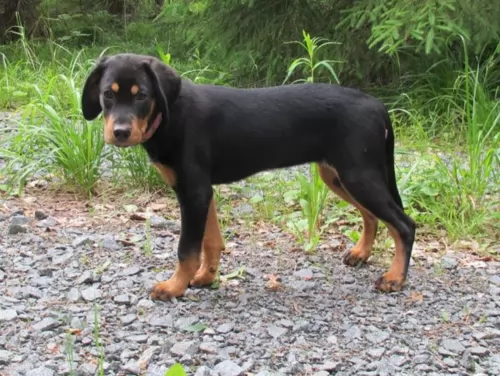 The Smålandsstövare is a muscled, compact looking dog. The double coat is shortish to medium length and is thick and quite coarse to the touch. He sheds seasonally. The coat is usually black with tan markings.
The Smålandsstövare is a muscled, compact looking dog. The double coat is shortish to medium length and is thick and quite coarse to the touch. He sheds seasonally. The coat is usually black with tan markings.
The high set ears are medium length and floppy, the head is slim and the tail can be naturally short. Sometimes the tail is long and can be slightly curved in the spitz-like sabre fashion.
The eyes are brown and friendly. The height of these dogs is about 46 to 54cm and he weighs anything from 15 to 18kg.
Usually a well behaved, quiet, calm, gentle dog, the Smålandsstövare takes his role as guard dog seriously, wanting to protect his family.
His good temperament ensures he gets on well with all members of the family. He is full of energy and will need to be exercised well, whether it be ball games in the garden, a walk around the block, a run in the park or joining his family on hikes and camping trips.
It is why he won’t settle down well on a small property in the city. He needs larger premises to expend his energy, and if in cramped premises without exercise, he may resort to barking and whining and this may well drive your neighbors bats.
Training and socializing your Smålandsstövare will be necessary and it should be easy as he is intelligent.
 The Harlequin Pinscher may have once been good at catching rats but these days they are much more sought after for their ability to be a splendid companion and pet.
The Harlequin Pinscher may have once been good at catching rats but these days they are much more sought after for their ability to be a splendid companion and pet.
He is such an entertaining, social little dog, wanting to spend as much time with you as possible. He is fearless, energetic, playful, confident, loving and intelligent and those who have owned them say they are courageous way beyond their size.
He is strong willed, stubborn and confident and this larger-than-life dog is just waiting to show you what a wonderful friend he can be to you too.
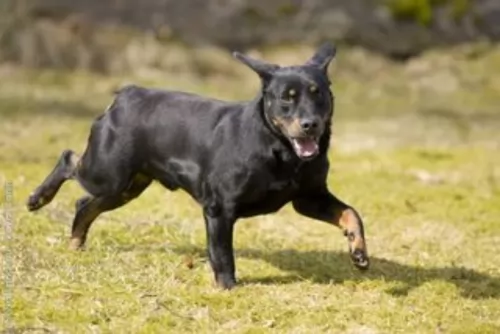 The Smålandsstövare is a robust dog with a lot of stamina. He will be wanting a lot of exercise and is ideal as a pet in the suburbs or the countryside but not ideal for city living.
The Smålandsstövare is a robust dog with a lot of stamina. He will be wanting a lot of exercise and is ideal as a pet in the suburbs or the countryside but not ideal for city living.
He makes a wonderful family pet, forming strong bonds with his owners. He makes an excellent watchdog too wanting to protect his family, and with this amicable, calm dog, you’re going to have a true friend.
 Harlequin Pinschers, just like other dog breeds, have health issues that they are prone to such as epilepsy, dental issues, obesity and Patellar Luxation.
Harlequin Pinschers, just like other dog breeds, have health issues that they are prone to such as epilepsy, dental issues, obesity and Patellar Luxation.
Some seizures in dogs are genetic or related to illness. A dog could have ingested something poisonous while a head injury can also cause seizures in dogs. If your pet has a seizure you may notice foaming at the mouth, drooling or twitching of the legs.
After a seizure you could see your dog walking in circles and bumping into things. It is important to get your pet to the vet as soon as possible.
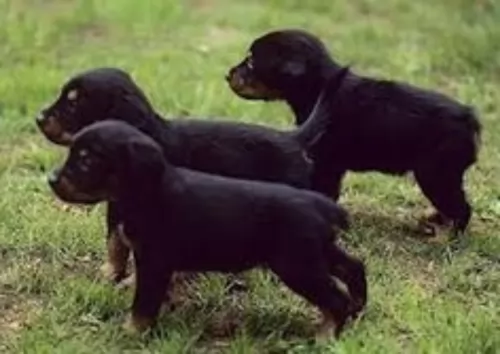 The Smålandsstövare is a rare dog breed and not much is known about congenital conditions to which he may be particularly prone.
The Smålandsstövare is a rare dog breed and not much is known about congenital conditions to which he may be particularly prone.
With good care he can reach 14 or 15 years of age. The floppy ears put him at risk for ear infections, while other conditions to watch for include hip dysplasia, cancer, bloat and obesity.
If you see your dog shaking his head or pawing at his ears, look inside because the ears may be red and inflamed. It is important to get help quickly for ear problems in dogs.
Ear canals are sensitive so if you don’t want to clean the ear and work on it yourself it is important to get your pet to the vet. The vet will clean your dog’s ears and also prescribe antibiotics.
For future treatment, you will need to clean your dog’s ears and keep them dry. If you don’t want to do this yourself, make sure to get him to professional groomers who will do this for you.
 The short, smooth coat of the Harlequin Pinscher is easy to maintain, shedding little. With such a small, nimble dog, you can even take a damp cloth and wipe him down. You can brush him down once or twice a week to keep his coat healthy and shiny.
The short, smooth coat of the Harlequin Pinscher is easy to maintain, shedding little. With such a small, nimble dog, you can even take a damp cloth and wipe him down. You can brush him down once or twice a week to keep his coat healthy and shiny.
Dogs can develop dental problems such as tartar and plaque build-up. and this can lead to canine dental problems which can turn life-threatening as bad teeth affect the heart, kidneys and the liver.
You need to brush your pet's teeth 2 or 3 times a week making use of canine toothbrush and toothpaste. Never use regular human toothpaste for your dog as it can be poison to him. It is why dry kibble is better than soft food as the soft food sticks to the dogs teeth.
Your Harlequin Pinscher is also a member of the toy breed group and he has high energy levels. Always choose a high quality kibble for a small dog breed and also which is in keeping with his age and activity levels. He will do well on a high quality dry commercial food, some raw meat or home-cooked food such as chicken, brown rice, pasta and vegetables. If your dog is an energetic dog, he will benefit from a diet rich in protein.
It will be tempting to feed your little pet tasty treats such as chocolate, nuts, coffee and milk but be careful as these can cause severe digestive problems with your dog.
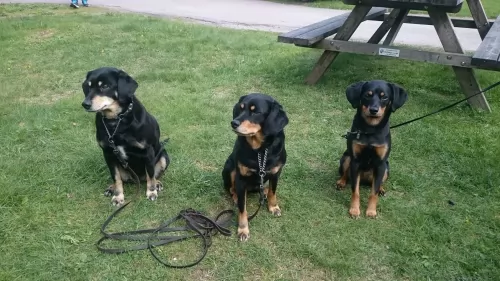 Choosing a good diet is imperative for the Smålandsstövare. Choose a commercially manufactured dog food high in vitamins and minerals.
Choosing a good diet is imperative for the Smålandsstövare. Choose a commercially manufactured dog food high in vitamins and minerals.
Give your dog a treat by providing him with some home-made food. It can be added into the dry kibble about twice a week as a treat. Boil brown rice and chicken in a pot and add in sweet potatoes, carrots and spinach. Chop all this up and give it to your dog in small portions. Also try to include some raw meat into the diet.
The Smålandsstövare is a very energetic breed and he is going to require some vigorous exercise every day. Take him for walks, allow him to run with you when you cycle or jog or take him swimming.